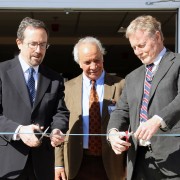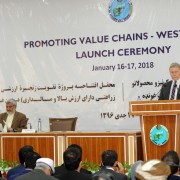Speeches Shim
USAID hosted the Ministry of Mines and Petroleum (MoMP) and more than 80 private sector business leaders at the U.S. Embassy to discuss reform strategies and business openings for the Afghan mining sector. Afghan government officials, including Acting Minister of Mines and Petroleum Nargis Nehan; private sector mining company representatives; international partners; and officials from the Afghan and international Chambers of Commerce attended the day-long dialogue. Participants focused on key opportunities and challenges in the mining sector and took part in interactive roundtable discussions with Afghan government representatives.
In a major step toward facilitating exports by air, the Afghan government inaugurated a One-Stop Shop (OSS) in the Hamid Karzai International Airport (HKIA) Customs Zone with the support of USAID’s Afghanistan Trade and Revenue Project. USAID support focused on the construction of the infrastructure. USAID will continue to work with staff of the OSS on custom processes and training for staff. The new facility significantly reduces the time required to export goods by streamlining and automating customs documentation. The opening ceremony was organized by the Afghanistan Customs Department (ACD), the Afghanistan Chamber of Commerce and Industries, the Afghanistan Civil Aviation Authority, and USAID.
The United States Government and the Ministry of Finance of Afghanistan signed a letter for the disbursement of $100 million to the National Unity Government (GNU) for achieving development reforms under the New Development Partnership (NDP). The release of these funds is tied to the Afghan government’s achievement of specific development results and implementation of key policy reforms, including improved revenue collection, reducing corruption, and reducing poverty by helping the poor and marginalized, especially women. This is a part of the ongoing commitment by the U.S. Government to improve the welfare of the Afghan people.

A new dormitory, designed to house 200 female students, was inaugurated today by U.S. Ambassador to Afghanistan John R. Bass, USAID Assistant to the Administrator for Afghanistan and Pakistan Gregory Huger, and American University of Afghanistan (AUAF) Registrar Dr. Julie Barker Holland. Constructed with support from USAID’s Promote Gender Equity and Women’s Empowerment program, the new facility is designed to increase female attendance at AUAF by providing a safe and secure living and learning environment.

The United States Agency for International Development (USAID), in partnership with the Food and Agriculture Organization of the United Nations (FAO), launched the Promoting Value Chains–West project on Tuesday, January 16, 2018. The project promotes inclusive growth and job creation in the agricultural sector by strengthening the capabilities of producers and private enterprises to effectively link Afghan farmers to domestic and international markets.
On January 4th, President Ashraf Ghani attended an inauguration ceremony in Kabul, officially launching the extension of the national power grid to Ghazni. This represents a significant milestone in the development of Afghanistan’s electrical infrastructure, marking both the first time Ghazni residents have had direct access to imported electricity, and extending the reach of the national grid.
Policies to support Afghan women who work in government were reviewed at a conference held today in Kabul. Over 150 officials, representing 36 ministries and independent agencies of the Government of the Islamic Republic of Afghanistan, discussed gains in the implementation of policy reforms aimed at removing barriers to women in the government workplace.
The United States Agency for International Development (USAID), the Global Alliance for Improved Nutrition (GAIN), and the Ministry of Public Health (MoPH) in Afghanistan released the implementation results of a two-year food fortification project in Afghanistan. The document, released during a stakeholders’ workshop, highlights the achievements, challenges, and lessons learned during the life of the project.
One of the most difficult challenges for female farmers and women operating agriculture-related businesses in Afghanistan is access to credit. In addition, many women often do not understand how credit can help support the growth and expansion of their businesses.


Comment
Make a general inquiry or suggest an improvement.